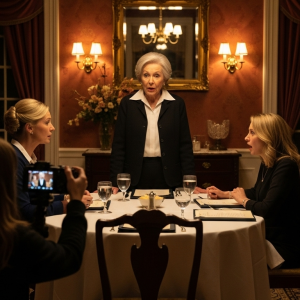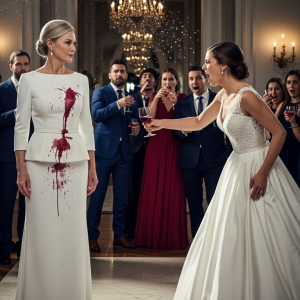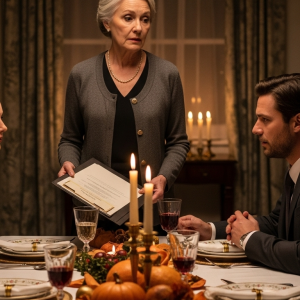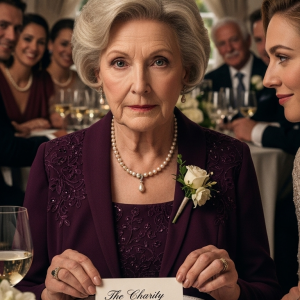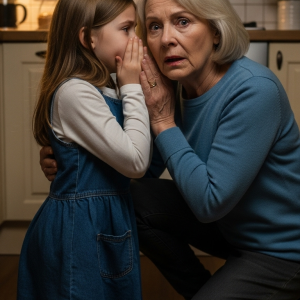Before you hear my story, let me ask you something. What would you do if the person you loved most in this world humiliated you in front of everyone? What if you sacrificed your own dreams to build theirs, only to be mocked and discarded? I stayed quiet for too long. But when I found out the truth, everything changed.
My name is Helen Carter. I am seventy-four years old. Widow, artist, grandmother. I lived a quiet life in a modest little home in Montpelier, Vermont. My days were spent painting and thinking of the people I loved—mostly Madison. Madison is my granddaughter, but I raised her like a daughter. My own daughter, Lauren, was overwhelmed, working two jobs to stay afloat. So, Madison spent her early years with me, finger-painting in my kitchen and calling me Nana.
Years passed. iPads replaced storybooks. Social media replaced our painting sessions. But I never stopped loving her. For twelve years, she never knew that I was putting aside whatever I could from my fixed income—skipping medications, saving on groceries—to build a college fund for her. I knew she dreamed of going to CalArts, the big, shiny, expensive school in California.
For her eighteenth birthday, I wanted to give her more than money. I wanted to remind her of who we used to be. So, I painted her a gift: a memory on canvas. I spent weeks on it, my wrists aching. I painted the old swing in our backyard, our golden retriever Max, and the daffodils that bloomed every April. I wrapped it carefully in brown craft paper and tied it with a white satin ribbon.
The party was nothing like the backyard barbecues I used to throw for her. This was glossy: white linen, a catered buffet, a DJ. A whole table was stacked high with designer boxes. I stood there in my old gray cardigan, clutching my gift, feeling invisible. Madison wore a tight pink dress and heels, moving from table to table, laughing loudly and taking selfies.
When she finally got around to opening gifts, she reached for mine. “Oh, this one’s from my nana,” she said, forcing a smile. She unwrapped the paper and held up the painting. A hush fell over the crowd. Then came the laugh.
“Are you serious?” she said, holding it up like a joke. “A painting? That’s it? It must have been cheaper than buying a real gift.” The kids around her snickered. Someone muttered, “Vintage vibes, I guess.” Lauren, my own daughter, gave me a quick, uncomfortable look but said nothing.
I stood frozen. “It’s sweet, I guess,” Madison added with a shrug, propping the canvas against a table leg like a forgotten decoration. They all moved on. No one saw my face. That’s the thing about being invisible; no one notices when you’re in pain. I turned and walked back to my car, each step dragging years of sacrifice behind me. I sat in the driver’s seat, and a single tear slid down my cheek, landing right on my wedding band. The painting was the most honest thing I had to give, and she didn’t just reject it. She spat on it.
When I got home, I walked into the kitchen and stood in the dark. The silence of the house wrapped around me. I opened a drawer where I kept a thick folder labeled: College Fund: Madison. It was stuffed with twelve years of documents, receipts, and bank statements—a paper trail of my love. Every deposit represented a small sacrifice: a skipped haircut, a winter with the heat kept low. Every time, I’d told myself, It’ll be worth it. She’s worth it.
I turned on my old desktop computer, logged into the online banking portal, and stared at the balance: $201,452.18. I knew exactly what every one of those dollars had cost me. Then, I clicked Transfer. Not to Madison. To me. To my personal checking account. I watched the progress bar move slowly across the screen. Transfer Complete. Balance: $0.00.
I closed the folder and shut the drawer. I wasn’t doing it out of spite or revenge. It was something else, a quiet decision made in a storm of humiliation. For the first time in my life, I chose me. Not my daughter, not my granddaughter, not the idea of what a good grandmother should be. Just me. I made a cup of tea, sat in the quiet, and for the first time in a long time, I didn’t feel angry or powerful. I just felt done.
The next afternoon, Madison was on my porch with a tray of expensive cookies, her smile too bright to be real. “Nana,” she chirped, wrapping her arms around me. I stiffened, my body remembering her laughter at the party, but I let her hug me.
“I wanted to apologize,” she said, sitting at my kitchen table. “I was just overwhelmed. I didn’t mean what I said about the painting. It’s actually beautiful.”
I nodded slowly, trying to read her face. I wanted to believe her.
“I miss you,” she added, her eyes shimmering. “I know I haven’t been around. I’ve been thinking a lot about college, about CalArts. I’m not here for the money, Nana. I swear. I just… I miss us.”
The words wrapped around me like ivy: soft, familiar, and dangerous. I felt something loosen in my chest. Maybe she was growing up. Maybe she was truly ashamed. “I’ll think about things,” I told her gently. “But I’m glad you’re here.” She smiled, the same brilliant smile from when she was seven. We ate cookies. She helped with the dishes. She even brought up old memories of the swing and our dog, Max. My heart began to believe again, to soften.
I didn’t sleep well that night. Her voice replayed in my head: I’m not here for the money, Nana. I swear. But louder than her words was the echo of that birthday party, that laugh, that cheap shot. I pushed the doubt down, buried it deep. Because sometimes, you’d rather believe a lie that feels like love than accept a truth that leaves you all alone.
It was a cloudy Tuesday when I found out for sure. Madison had come over that morning with her laptop, saying she needed help printing a scholarship form. She left after lunch in a rush. I was humming an old jazz tune while washing dishes, thinking, Maybe this is healing. Maybe we’re really rebuilding something.
Then I went into the study. Her laptop was still there, open and humming softly. I was about to close it when the screen caught my eye. A chat window was open. At the top, it read: Madison chatting with Emmy. My gut told me to look away. Something deeper told me to read.
The last message hit me like a physical blow: Don’t worry, she’s falling for it. I’ve been sweet, cried a bit, told her I missed our bond. Classic emotional bait. She always melts with that family crap.
My hands trembled. Another message blinked below it, fresh and ruthless: Just need a couple more visits. She’s already thinking about putting the fund back, I know it. Told you she’s predictable. I’ll be in CalArts by fall. #Manifesting.
I stared at the words. They weren’t just cruel; they were calculated. A plan. Every visit, every hug, every “I miss you,” was a script written to manipulate me. I sank onto the sofa, the laptop still open, the words blaring like neon signs. I felt cold, like someone had turned off the sun. This wasn’t grief for a person I’d lost. It was grief for a person who had never really existed.
The sweet, curious child with paint on her cheeks was gone. In her place was a predator, targeting my emotions, using love as a weapon. I finally understood. She hadn’t rejected the painting. She had rejected me. That night, I didn’t sleep. I sat in my old rocking chair, wrapped in a blanket, and felt a quiet, focused rage begin to burn. I had spent a lifetime sacrificing pieces of myself so no one would leave. And for what? So my granddaughter could laugh behind my back and call me predictable. I was done melting.
Around 3 a.m., I got up and stood in front of the painting she had called cheap. The memories on that canvas no longer hurt. They were proof. Proof that I had loved, that I had been real even when they weren’t. I took a picture of it with an old camera. Then I sat at my computer and found an online group for older women artists. My fingers trembled slightly as I uploaded the photo.
In the caption box, I wrote: “This painting was called ‘cheap’ by someone I love, but it was painted with everything I had left. Every brushstroke is a memory. Every color, a piece of my heart. Maybe it’s not enough for some people, but it was everything to me.”
I hit post. I didn’t expect much. It wasn’t about attention. It was about finally using my voice, not just my brushes, to tell the truth.
When I woke up the next morning, the sun was filtering through the curtains. I shuffled over to the computer and saw the screen glowing with notifications. The painting had caught fire overnight.
The comments poured in: This made me cry. There’s so much emotion here. Whoever called this cheap doesn’t know what love is. Do you sell prints? I want this hanging in my home.
Messages arrived from strangers, women who saw themselves in my story, who had been called too sentimental, too soft. Then one message stood out. Hi, Helen. I’m a curator for a small gallery in Brooklyn. Your piece stopped me cold. Would you consider exhibiting it? We’d be honored.
I read it three times. A gallery. In Brooklyn. My hurt was being transformed into something beautiful. I answered with trembling hands, “Yes, I’d be honored, too.” The curator, Dana, called later. “I want to treat this piece with the care it deserves,” she told me. “It’s not just art. It’s a story people need to hear.” She asked for a title. I smiled. “Call it The Rejected Gift.”
Two weeks later, I stood in a sunlit gallery in Brooklyn. My painting hung on a clean white wall, framed simply, lit softly. The Rejected Gift, the placard read, by Helen Carter. I must have stared at that little sign for five full minutes.
“We had over three hundred people at the opening,” Dana whispered beside me. “And there’s more.” In her office, she showed me a printed email. A private collector in Manhattan wanted to buy the piece. For twenty thousand dollars.
I stared at the number. My pain had value. My truth had worth. “Tell him yes,” I said, my voice barely steady. We sealed the deal that day. I signed my first artist’s contract, and for the first time in what felt like years, I smiled like I really meant it.
Back home, Madison showed up. She hadn’t called. “I saw the painting online,” she said, her eyes glossed with tears. “People are talking about you. I wanted to say sorry again. For everything.” I said nothing.
She fidgeted, her performance less convincing this time. “I messed up, Nana. I was stupid and selfish. But I want to fix things.”
“What do you mean, ‘fix things’?” I asked, my voice calm.
She swallowed. “I still want to go to CalArts. And maybe… if things are different now… maybe you could…” There it was. The truth, bleeding through the apology. Still chasing the money.
But now, I wasn’t chasing back. I stood up. I didn’t shout. I simply said, “You called my love cheap. You pretended to care because you thought I’d fund your dream. You treated me like a transaction.”
She opened her mouth, but I held up my hand. “You lost something that day, Madison. Not just money. You lost the one person who believed in you no matter what.” I walked to the door and opened it. “You want something from me? Earn it.” She left without another word.
A few days later, my daughter, Lauren, stormed in. “Madison is crying!” she accused. “She says you humiliated her, that you’re throwing her away over a painting!”
I calmly held up the thick folder labeled College Fund. “This,” I said, “is twelve years of my life. Twelve years of sacrifice. And she spat on it. Then she came back and performed an apology to get it back.”
Lauren’s face flushed. “So what now? You let her dreams fall apart?”
“She’s eighteen,” I said. “If her dreams are real, she’ll fight for them, work for them. She won’t manipulate a woman who loves her.” I set down a new folder on the table, labeled in fresh black marker: Helen Carter’s Freedom Fund. “I’m using the money now,” I told her. “Not on anyone else. On me.”
She left in silence. That’s when the walls of my small world crumbled down, and I finally saw the sky. The story of The Rejected Gift exploded. I was invited to speak at conferences, to write a memoir. A gallery in Paris wanted to feature my work in a traveling exhibit. I wasn’t just seen; I was heard. Not for being someone’s mother or grandmother, but for being Helen.
That night, I walked into my studio and pulled out a blank canvas. I didn’t paint Madison. I didn’t paint the past. I painted a woman standing at the edge of a cliff, arms stretched wide, wind in her hair, looking out over a vast horizon with no fear in her eyes. I titled it Freedom. I had given my heart away for years. Now, I was taking it back. And for the first time in my life, I was finally, fully, and completely free.
